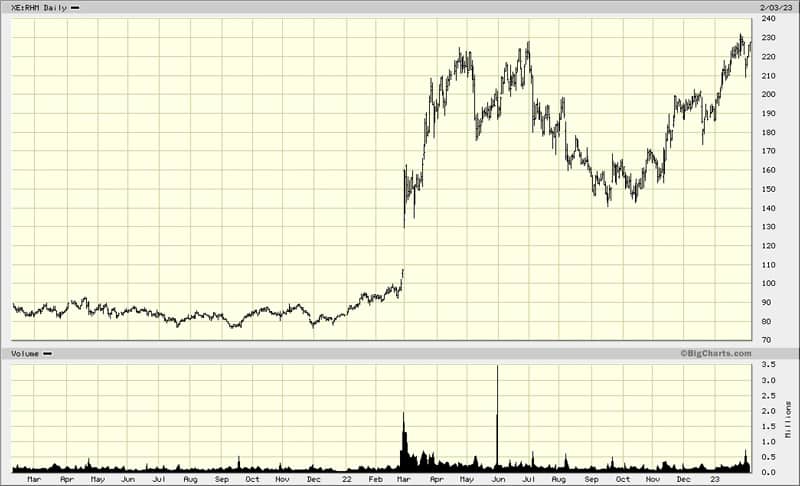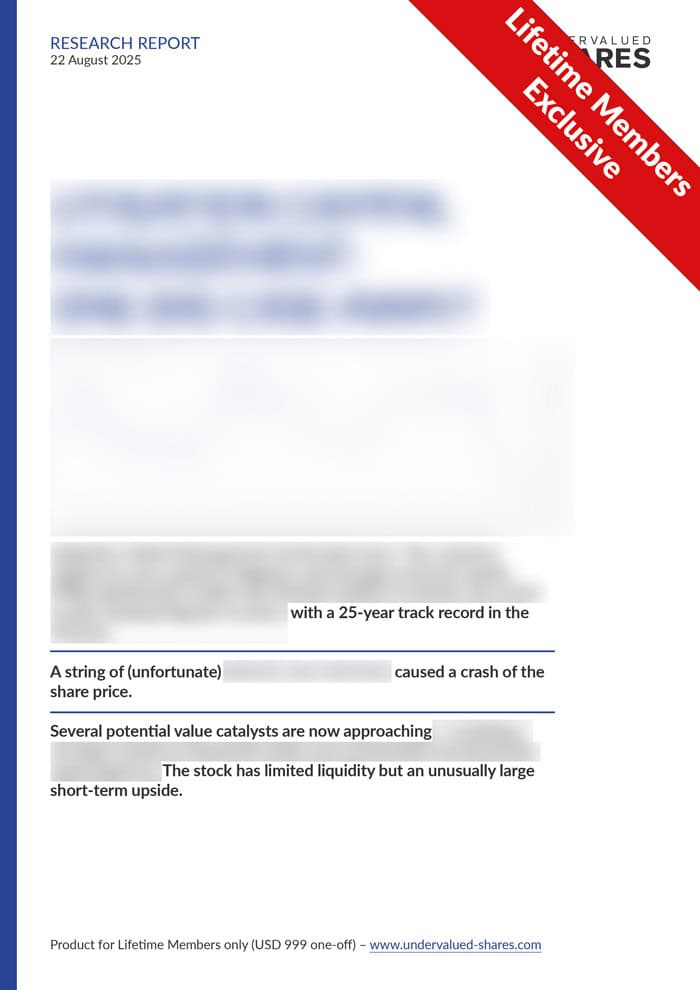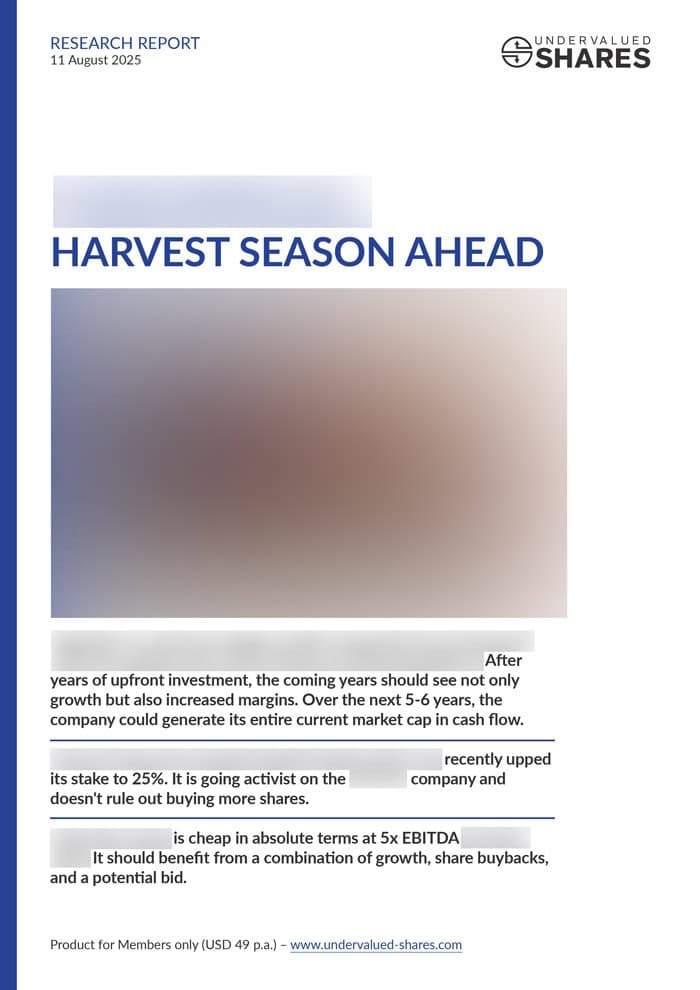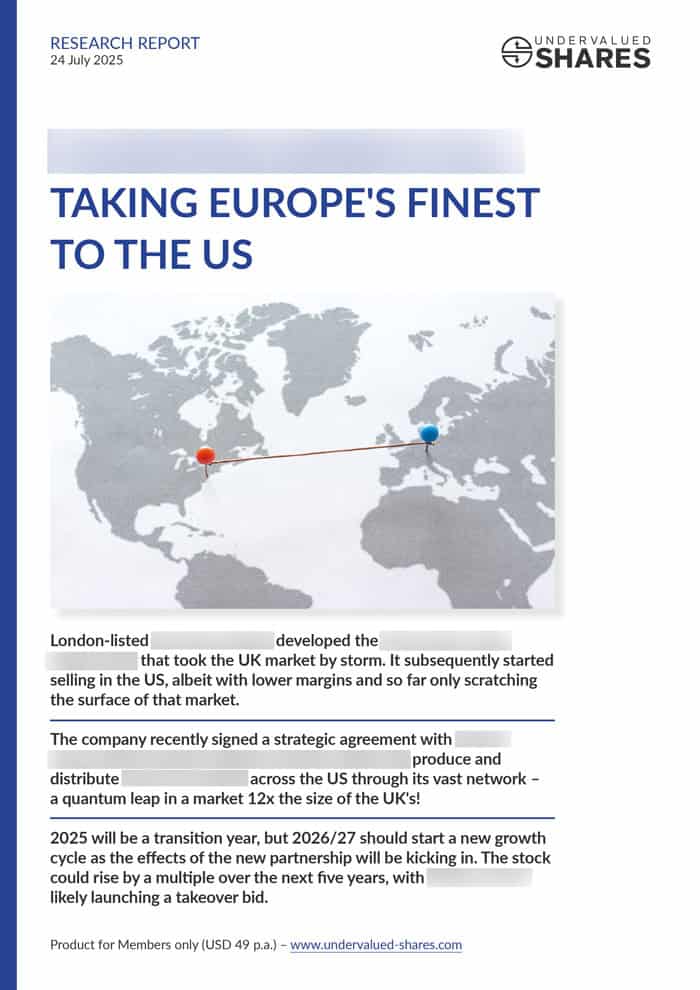Emaar Properties’ stock has already multiplied several times. What potential remains, and which other contrarian investments merit attention?
Zeitgeist, turning points, and the value of forgotten truths
Following, analysing and capturing the zeitgeist, or "spirit of the age", should be one of the most important priorities for investors.
Once the zeitgeist changes, so do investment fads and valuations. The combination of an investment theme getting back in fashion and its valuation multiples expanding can make for a powerful double-effect on your investments (and the other way around). It's these major turning points in dominant narratives that can make for the biggest investment opportunities.
Few would doubt that the 2020s are likely to bring many critical turning points – economically, financially, and politically. However, can the zeitgeist be measured and predicted? Can you build this concept into your investment strategy?
Undervalued-Shares.com went on to investigate. As a heads-up, today's article veers towards an intellectual exploration of a subject that I had long been curious about and which deals with getting the big macro calls right, but it does not contain any immediately actionable advice. Discussing a specific company is something that I plan to return to next week.
My biggest recent regret
As a blogger, stock market commentator and occasional rabble-rouser, it's my job (and passion) to try and predict turning points before they happen (and at the occasional risk of being controversial).
In particular, I love exploring ideas that seem far-fetched at the time of publication, but which could gain traction later on because of a specific, foreseeable reason.
Most of the time, I fail. As I never stop warning people, no one should mistake Undervalued-Shares.com for investment advice. It is merely an outlet for myself to explore ideas and take others along for the journey.
Occasionally, I get it right.
At other times, I had the right sense but didn't write about it. Just like the investment you thought of making but didn't (and then watch soar), these ideas can count among the most painful experiences. Often, it's the ones that got away which hurt the most.
E.g., in December 2021, I was all set to write a three-part Weekly Dispatch series asking "Which stocks to buy when war comes to Europe?".
I had it all laid out:
- Making the series controversial by using the word "when" rather than "if".
- Being contrarian, given that no one wanted to touch defence stocks at the time.
- Delving into fascinating history by referencing books such as "The Causes of War".
In the end, I postponed the series because I felt it wouldn't resonate with readers during the run-up to Christmas.
The rest is history, courtesy to the conflict that broke out in Ukraine only a couple of months later. Defence stocks have since turned from pariah to investor darling, and skyrocketed from their bombed-out starting point.
I hadn't anticipated the specific war that Europe is now grappling with, but I had taken inspiration from a statement that Stan Druckenmiller had let slip out in a Bloomberg interview in December 2019. He voiced his view that the European Union was "a union of countries who seemed to all hate each other and can't make a decision on anything". As someone who had long been so wary of Continental Europe that I eloped to the safer side of the Channel at the tender age of 23, the notion that war would eventually come back to this historically rather troubled continent had long seem a given to me. I had drawn up a list of potential trouble spots and assembled material on undervalued stocks of defence companies.
What subsequently happened to the stock price of arms manufacturers is a great example of a changing zeitgeist.
It had been a dominant ideal of Western society to be against any and all wars, weapons, armament, defence, defending borders, and related concepts. One of the most remarkable expressions of that era had been Angela Merkel's famous 2015 statement that Germany would not be able to secure its borders even if it wanted to and should just leave them open. Fast forward a few years, and Germany is sending tanks to the Eastern plains to help another country secure its borders. Suddenly, patriots fighting (and dying) for their country has become a cause célèbre for the same chattering classes that had wanted nothing to do with the subject previously. Could anyone have dreamt up a more unlikely scenario?
Then again, you could just as well ask if all this wasn't entirely predictable. After all, what were the chances that a continent which had seen 500 years of never-ending bloodshed would permanently change its modus operandi? Those over 40 will remember how in the 1990s, that peaceful holiday destination formerly known as Yugoslavia descended into armed conflict and genocide. Old habits die hard, and Europe simply has had a long-standing habit of being the host of a major armed conflict every generation or two.
These turning points make for massive opportunities for investors, and the renaissance of formerly unloved defence stocks was just one of the more memorable, recent ones.

The chart of Rheinmetall - German tanks are back in demand.
Can anyone predict such changes in public perception, policy, and investment priorities?
And how does the concept of zeitgeist fall into all of this – if it's even relevant at all?
I recently stopped flagellating myself over the series that I never wrote. Instead, I started to look for the next such unlikely turning point, and one that investors can benefit from during the months and years to come.
An underresearched concept
Zeitgeist is the rare occasion of a German word becoming accepted into the English language. Just as with the German concept of Schadenfreude (pleasure over someone's misfortune), there isn't any equivalent English word that truly captures the nuance of the German term.
The concept of zeitgeist originated in 18th and 19th century German philosophy. The Merriam-Webster dictionary defines it as "the general intellectual, moral, and cultural climate of an era". The Cambridge Dictionary summarises it as "the general set of ideas, beliefs, feelings, etc. that is typical of a particular period in history".
The term has long been fashionable among metropolitan liberals eager to indicate that they are learned, worldy characters. Despite the term's popularity, there isn't much literature about it. The only truly interesting, in-depth book I found is Maike Oergel's "Zeitgeist – How Ideas Travel".
As Oergel notes in the introduction of her 2019 academic book:
"Despite the evident popularity of the term, there is no research in English into the concept of zeitgeist."
In a way, it's not surprising that there has been little research into the subject. Measuring the public acceptance of ideas is inherently complex, and it's interwoven with overlapping concepts, such as the more short-lived public opinion.
Does the world of investing have a suitable equivalent concept?
It does, and the concept is highly relevant.
Decade-long bull market themes
During my years of collecting material about zeitgeist and investing, I found no other piece of writing more useful than the 6 December 2022 essay by Gavekal, the eponymous research firm run by Louis-Vincent Gave:
"Roughly every decade or so, financial markets fall in love with a new narrative.
This narrative typically centers around one of three core ideas: the opening of new markets to capitalism (Ricardian growth), technological breakthroughs (Schumpeterian growth), or the fear that in the coming years there will not be enough for everyone (the Malthusian constraint).
The narrative inherently 'makes sense.' … The end of the 1970s saw a bubble in energy stocks, and that in the late 1980s there was a massive bubble in Japan, in the late 1990s a bubble in tech stocks, and in the early 2010s a bubble in all things linked to China."
These bull market themes are the stock market equivalent of the zeitgeist. There isn't a single investor in the world who wouldn’t like to have the superpower of identifying the next such theme in advance.
The question is, how to go about it?
Enter – the "narrative"
Oergel's 326-page investigation into the question of how ideas travel concludes that there is "to a large extent, a rational and empirically verifiable …. dynamic by which ideas are successfully disseminated."
Very basically, whether a new idea resonates "relies on a broadly shared notion of what the issues are; and in the second instance … on the extent to which the interpretation of the issue makes sense to their audiences". It helps if there is are "bold, extraordinary individuals whose genius drives great revolutions" (Elon Musk comes to mind, instantly, as a great example of how one individual can single-handedly influence an era's zeitgeist).
So far, so simple. But how is one about to go and measure (or predict) such changes?
The single most important practical piece of research into this is Robert J. Shiller's "Narrative Economics: How Stories Go Viral & Drive Major Economic Events".
The Nobel Prize winning economist and author of "Irrational Exuberance" criticises how "traditional economic approaches fail to examine the role of public beliefs in major economic events – that is, narrative."
Underlying narratives – which, one could argue, are largely the same as the zeitgeist – can have powerful effects on markets and economies, but "have traditionally been ignored in economics and finance because they seem anecdotal and unscientific."
Shiller's 2020 book "offers the beginning of a new theory of economic changes that introduces an important new element to the usual list of economic factors driving the economy: contagious popular stories that spread through word of mouth, the news media, and social media. … Narrative Economics is the study of the viral spread of popular narratives."
The performance of stocks is widely believed to hark back primarily to figures contained in Excel spreadsheets. However, just as much it's influenced by the zeitgeist, prevailing narrative, or whatever else you want to call these elusive factors. In many ways, narratives may be just as powerful as underlying metrics and economics – since they go to the heart of how humans absorb and process new information.
Instead of reading Shiller's tome, you could watch his 1h 30min presentation of the subject at a university. With just 23,000 views as of February 2023, this captivating tour de force through the subject is one of the Internet's underappreciated gems (but spare yourself from the nine-minute introduction).
Who would doubt the importance of these factors when it comes to anticipating (and benefitting from) critical turning points?
It's all the more important a question to ask, given the likelihood that the next five to ten years will see humanity arrive at not just one, but a whole set of powerful junctures. Broadly speaking, we will probably witness the combined impact of powerful demographics and generational changes unfolding alongside the transformative effects of the information age. Is there anyone who doesn't have a sense yet that the world is approaching a confluence of serious turning points?
Predicting even just one of them correctly and in a timely fashion could set you up for life financially.
Hence, it's worth making an effort to see where we might find a predictable turning point (or two, or three).
Forgotten, dormant truths staging a comeback
Of all the points Shiller raises in his seminal work, none resonated more with me than his writing about "narratives of the past that are mostly inactive or largely forgotten today", but where a new context can turn "an old narrative into a major epidemic, sometimes after a long time lag".
In my three decades of hunting for valuable investment ideas, nothing has proven more consistently valuable than to look at old, forgotten ideas and analyse when (and how) they might stage a comeback.
Here are some examples:
- Europe as a reliably squabblesome continent with a permanent need for investments in defence? This inconvenient truth had disappeared off the radar temporarily, but it has just made those investors rich who had bet on defence stocks when they were down and out. As this Weekly Dispatch went to press, it even emerged that "Germany is considering re-routing existing subsidies for eliminating coal-fired power plants to help defense manufacturers build new production facilities", as Bloomberg reported on 3 February 2023.
- Border walls as history's single most successful concept for protecting a nation? Despite overwhelming evidence from millennia of human history, the concept of a wall to protect people had become so contentious that US president Donald J. Trump managed to make millions of people instantly lose their minds over the mere mentioning of a wall. This dislike of protective walls proved a temporary madness. Even the European Union has now reverted back to the time-tested concept of a wall, as seen in the recent building of an impenetrable barrier between the EU's outer border between Greece and Turkey.

Border walls are making a comeback in unexpected places.
- Ancient Chinese doctors paid a retainer to keep their patients healthy? We have just lived through a period of humanity where Western cultures turned the concept onto its head (to some extent, at least). Suddenly, the writing is on the wall that preventative medicine could be the next big thing in healthcare. Spotify's billionaire founder has just backed a company that "offers full-body scanning to help doctors find and *prevent* disease", and money has started flooding into the sector. Suddenly, the investment community has started to realise that "preventative care is key", as Sifted reported on 2 February 2023. (Any reader with good knowledge of the sector or specific investment ideas, please drop me a note!)
These are just some examples. In a way, this is the real-world equivalent to the investment world's concept of mean reversion. It hurts those who didn't see it coming, and benefits those who put themselves ahead of a trend.
It begs the question, what other long-forgotten, dormant ideas are making a comeback?
And how to position yourself as an investor?
The coming "Revenge of the Tangibles"
One investment theme that had long been neglected is that of our economies ultimately requiring "stuff" to function.
We have just lived through a decade that focussed on digital, and which saw a widespread belief among investors that "tangible" sectors would forever be out of favour. Of late, however, it has appeared like the all-consuming focus of markets with digitalia is gradually making place for a revenge of the physical and other old-fashioned concepts that were previously seen as outdated and yesterday's game.
The sudden focus on the defence industry is just one expression of this trend, as is the remembering that a country's borders matter after all.
What next?
The obvious next hammer to drop – in my view – is the fact that the world's economies are generally about to run short on raw materials.
Case in point, copper.
Whether you believe that parts of the world will go through an energy transition – or not – there is simply not enough copper to go around. As I outlined in my recent Weekly Dispatch about copper, even if ZERO copper was required to enable an electrification of certain countries that deem this a priority (such as Germany), there'd still be a looming shortage of copper from 2025 onwards. Copper is required for many different parts of life, and we simply haven't got enough new copper mines in the making to satisfy the growing demand.
Digging holes in the ground to dig up resources is still, for the most part, seen as an outdated and evil concept. In that sense, it's not too dissimilar from the idea of investing in defence two years ago. You risk getting yourself expelled from polite society if you lobby for digging holes. Still, the underlying realities make for a compelling investment case.
When you look at demand and supply trends for strategically important resources, it's difficult not to wonder if rich countries won't soon return to that other priority that nation states once had – that of having a safe, reliable supply of resources needed to operate and grow their economy.
In a seemingly globalised world, control over strategic resources long seemed like an outdated concept. Now that the world is visibly breaking into smaller political blocks again and following the supply chain problems witnessed over the past few years, relying on suppliers that are located on the other side of the Earth and/or are hostile ideologically suddenly doesn't seem like such a good idea anymore.
Will this realisation spread and become part of the 2020's zeitgeist?
It probably will, once it starts to affect a large enough number of people.
As Oergel's work concluded, something having an actual effect on a large enough number of people is one of the prerogatives for an idea to worm its way into the prevailing zeitgeist. Once it does, that complex and often overlapping mix of public opinion, dominant narrative and zeitgeist can change faster than anyone would deem possible – as witnessed of late with some of the subjects mentioned above.
Needless to say, it would be extremely valuable to know what is the current equivalent to what defence stocks were in 2020?
Questions I ask in my pursuing this subject include:
- What sector of the economy is heavily opposed by Hollywood actors and NGOs?
- Which stocks seem so hopeless that you would not even have heard of them yet?
- Where can you buy potential future cash flow at a ridiculously low valuation?
In my quest to occasionally get something right and land a 10-bagger (or better), I have come up with another idea that seems far-fetched by some measures, but is highly likely to happen eventually by other measures.
It's summarised in a new report that I'm just writing for Undervalued-Shares.com Lifetime Members. It's due to go out next week – watch this space!
Podcast: The History and Future of Frontier Markets Investing
What makes frontier markets investing so unique?
What we can learn from case studies and pioneering individuals who have shaped various developing markets over previous decades? What are the themes to track going forward?
Krishaan Khubchand of the Frontier Markets Podcast and I set out to investigate.
Podcast: The History and Future of Frontier Markets Investing
What makes frontier markets investing so unique?
What we can learn from case studies and pioneering individuals who have shaped various developing markets over previous decades? What are the themes to track going forward?
Krishaan Khubchand of the Frontier Markets Podcast and I set out to investigate.
Did you find this article useful and enjoyable? If you want to read my next articles right when they come out, please sign up to my email list.
Share this post:










